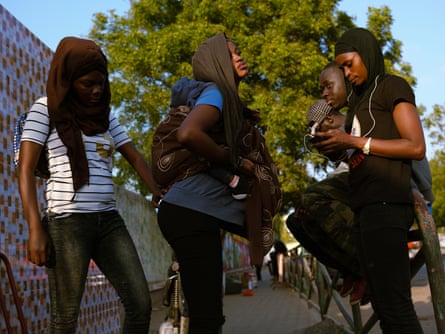Aminata Gaye picks up a grey scarf and stretches it into a T shape. She ducks under the fabric, wraps it around her neck and crisscrosses it over the crown of her head.
It is almost dusk outside, but in this windowless room there is no indication of time as Gaye gets dressed for a concert starting at 9pm. Her veil in position, the 27-year-old old is transformed into Mina la voilée (Mina the veiled one), her stage name as a rapper in Dakar, Senegal.
“When I sing, I am someone else,” she says. “I don’t feel anything anymore. I’m unwound. It’s like I’m another person when I’m on stage.”
When she first began rapping as a veiled Muslim woman, Mina endured a backlash on social media. Knowing that she was not alone was what helped her endure it.
Mina is a member of Genji Hip Hop – a collective of about 70 female Senegalese rappers, singers, DJs and graffiti artists. Starting life as a WhatsApp group in 2017, it has since blossomed into a civil society organisation that puts on concerts, holds workshops for women and speaks up about women’s issues in the west African country.
The women have fun and support each other as they address social taboos surrounding women’s rights. Their movement is both global and local: recently participants in the WhatsApp group discussed viral videos of women in Colombia fighting against rape, promoted Genji rappers’ music videos and shared inside jokes.
On stage, the performers rap and sing about relationships, society’s searing gaze on women, incest, family pressure and rape.

“Hip-hop has proven it can change things in Senegal, whether its social or political, it’s very engaged,” says Genji’s secretary general, Wasso Tankoura.
Senegal lags far behind other countries in the region when it comes to legally protecting women against domestic violence and rape, says Hawa Ba, Senegal director for the Open Society Initiative of West Africa. Ba attributes this partly to conservative religious forces in the 95% Muslim country, where leaders of religious brotherhoods often wield enormous power on policymaking.
One fight currently being waged by Genji is against Senegal’s rape law. Currently, rape is treated as a misdemeanour crime and the women want it upgraded to felony status.
“There is not a family in Senegal where someone does not see a case of rape, but no one discusses it because often the perpetrator is a family member,” says Tankoura. “It is very difficult to speak about it because the person who is raped is the one who is judged.”
Members of Genji are not keeping quiet. They are currently in the studio producing an ensemble song about rape and the changes that are needed. So far they’ve recorded the refrain:
No more questions! We’ve had enough!
We reclaim justice! It’s a right!
No more questions! We’ve had enough!
Rape is a crime
(Genji collective)
The support of fellow members helps the women stand up to the often overwhelming pressure they feel to conform.
“When you are a woman, normally in our country, they tell you how you must be,” says Mina. “You must, you must, you must. When they are always telling you what you should do, you won’t have confidence in who you really are, but when you are a rapper you have confidence.”
One example of the pressure on women to conform is in their marriages, says Mina.

Normally, wives are expected to stay home most of the time, do the cooking and cleaning, and not come home late – a problem that arises if a rapper marries, as concerts go into the night. Newly married, Mina splits her time between her family’s home and her husband’s. Her husband, Mamadou Sagne, is also a rapper, and she says marrying someone within the profession has made her life easier.
But others are not so lucky. The rapper and Genji member Eve Crazy recently divorced her husband after pressure from her in-laws to end her career became too much, she says.
They say we don’t have limits,
But if someone calls me a woman,
Then they have already put up barriers
To what they think I can do.
(Eve Crazy)
Eve Crazy gave up two jobs to stay at home, and cook and clean for the family she married into, but the pressure to dress and act a certain way continued. “I didn’t have any freedom,” she says, describing how subtle, daily pressures often weigh the heaviest on the women.
According to Wasso, the cultural concept of muñ is a thread that runs through the issues facing women in Senegal. The Wolof language word embodies the complex idea of societal expectations that dictate a woman must have “patience” and “silently endure” any harsh realities – even rape – for fear that speaking out will upset the social fabric of the family and community.
“We hold onto everything,” says Mina. “The woman must put up with everything. Marriage is like that. Even if you speak to your own parents, they will say that you have to endure it.”
Hip-hop allows the women to go against the grain. “It talks about everything,” says Mina of their art. “Everything society does not want you to talk about. Rap does not shut up, rap does not have muñ.”